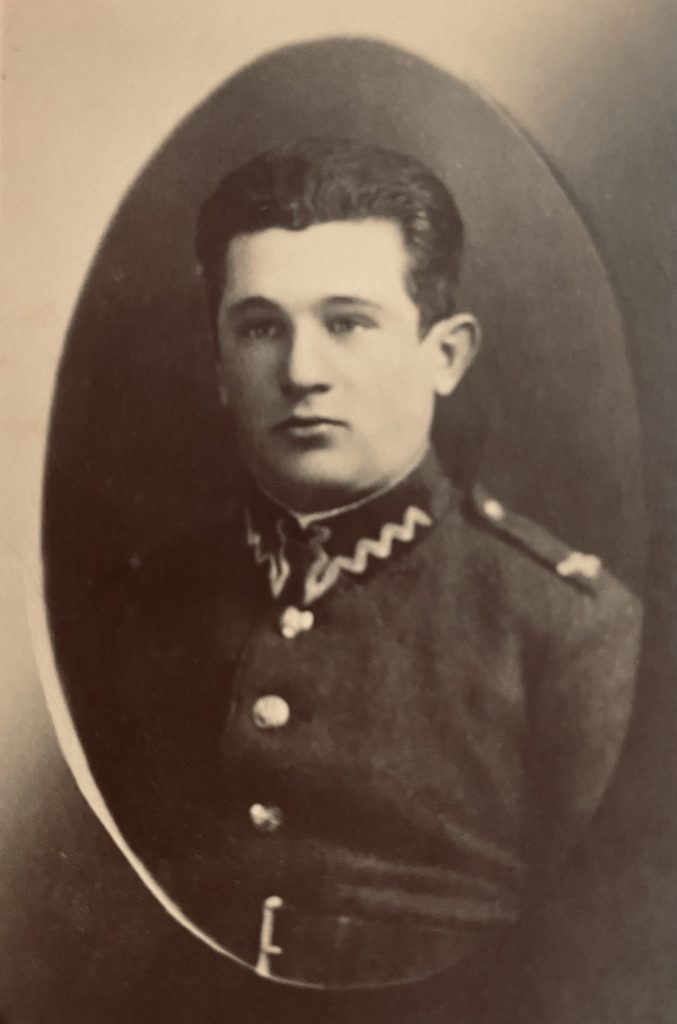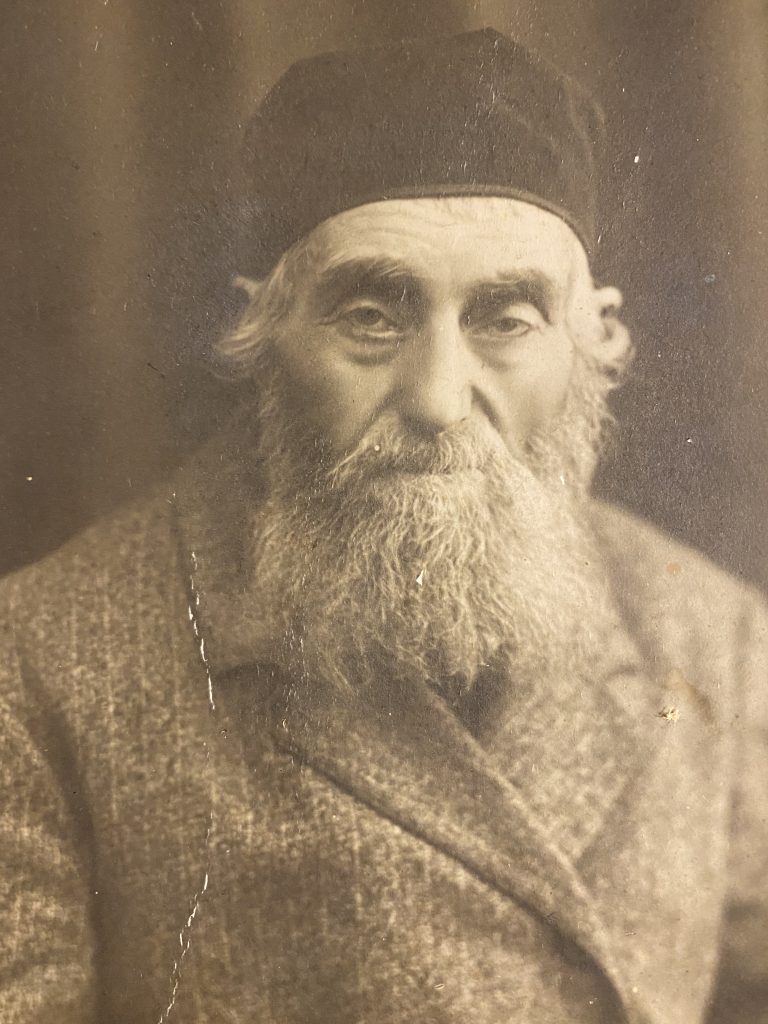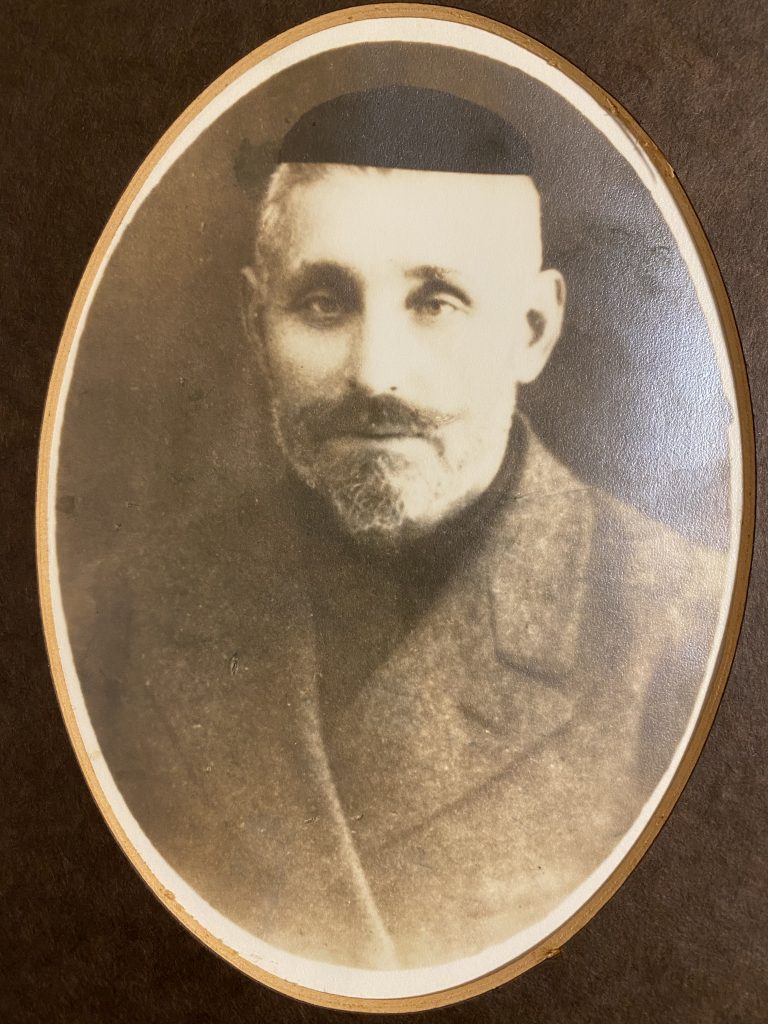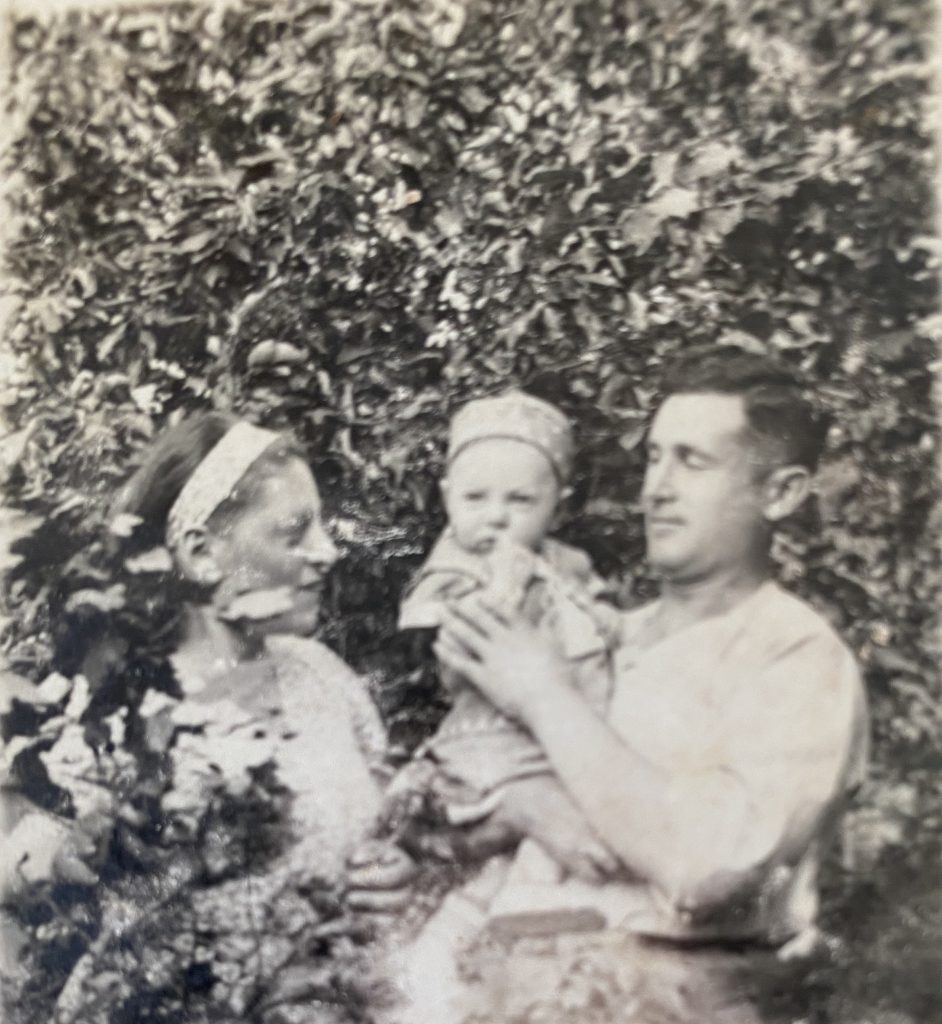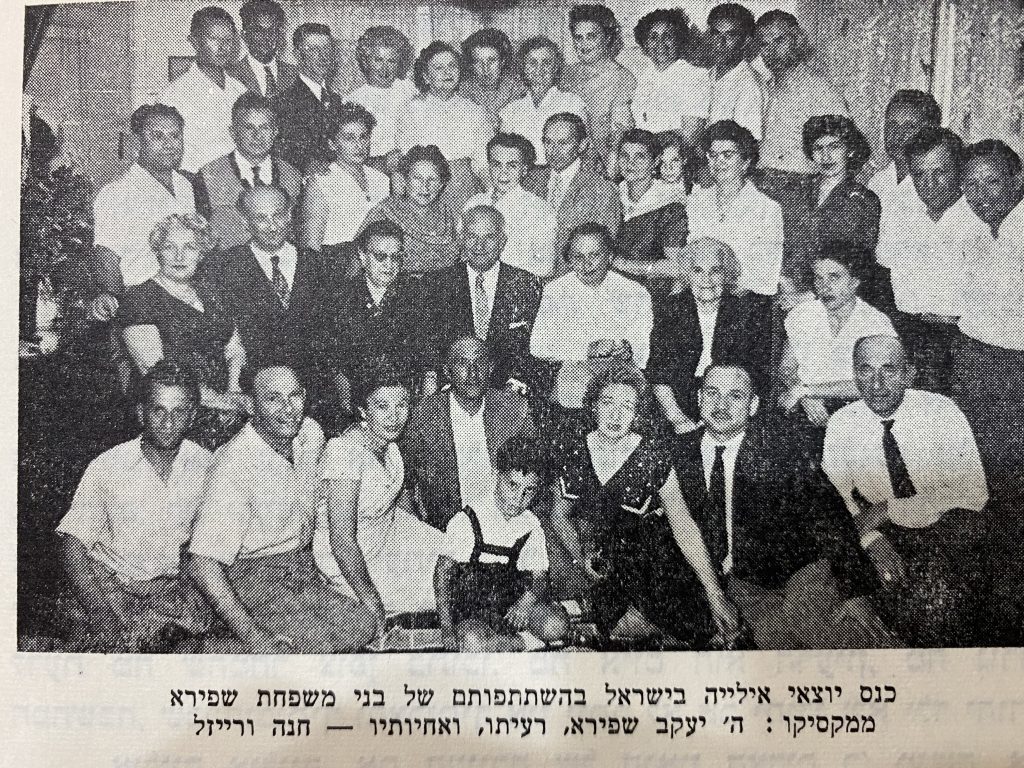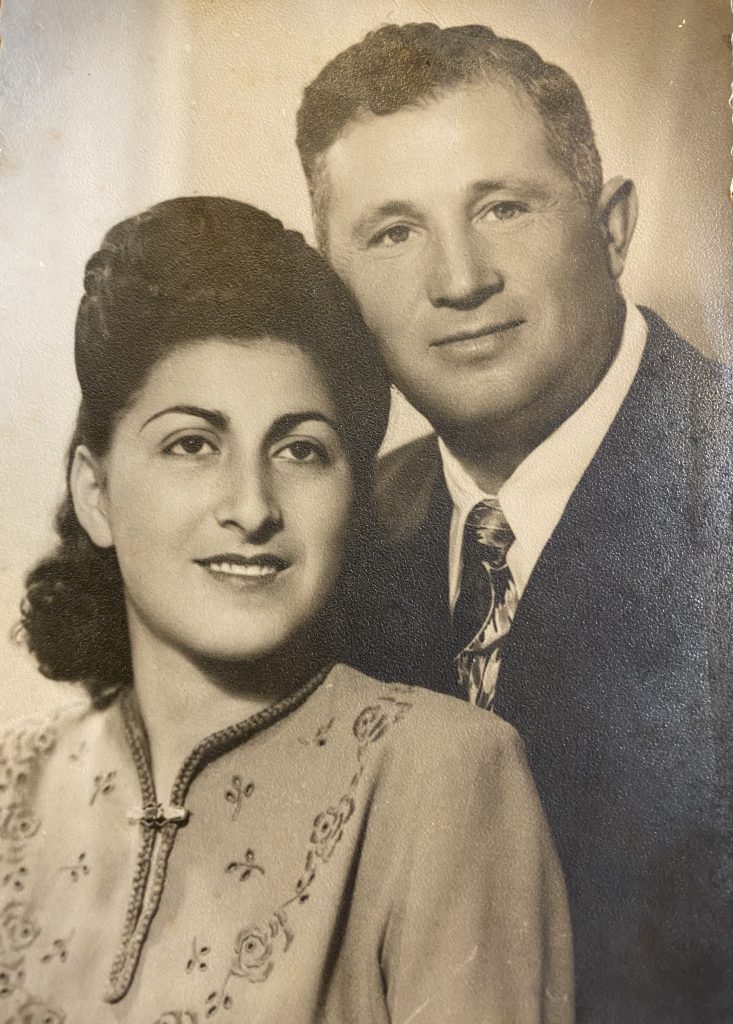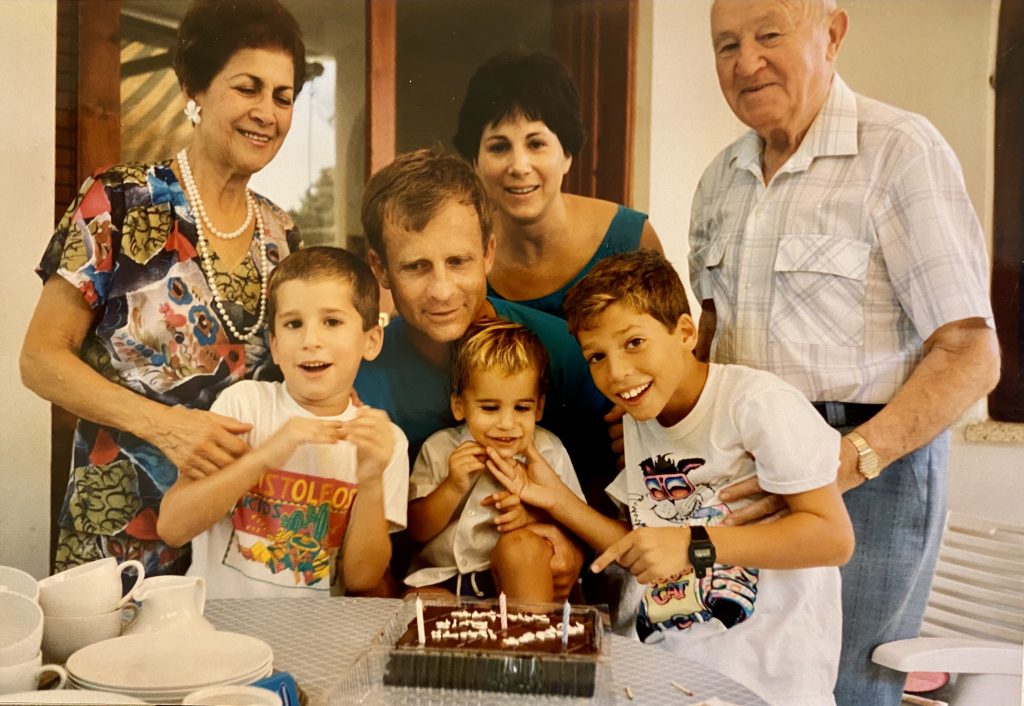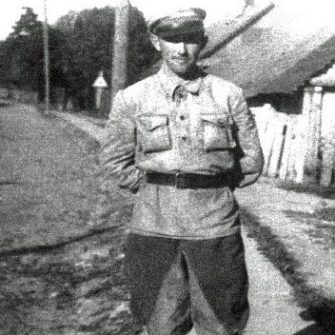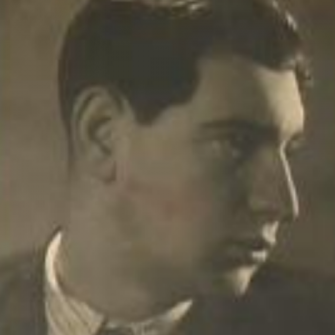Shraga Dgani (Feivel Solomiansky) was born on March 19, 1910, in the small shtetl of Ilya, Poland, now Belarus. He lived with his parents, Eliyahu and Chaya, along with his four siblings: Ahuva, Lipa, Ephriam, and Israel. As a child, Shraga attended Tarbut school where he learned the Hebrew language. He was trained to operate machinery in the flour mill and sawmill which belonged to his family.
Before the war, many Jews were influenced by the Zionist Movement. Shraga was among the organizers of the “Young Chalutz” Movement in his hometown, where youngsters were taught about Israel (then Palestine), given Hebrew lessons, and trained in agricultural work. He then joined the Polish Army and served as an officer.
By the time the war began in 1939, Shraga was married and had a son. After the Nazis occupied Ilya in July 1941, the Jewish community was soon forced into a ghetto. Shraga was permitted to continue working at his family’s flour mill, where he hid weapons that were smuggled to partisans and reported on German movements in the area.
On March 16, 1942, the Nazis began the first liquidation of the Ilya Ghetto. Shraga’s wife Chasya, young son Yehuda, brothers Ephriam and Israel, and his parents were murdered that day. Shraga survived by lying under a pile of snow for nearly 24 hours until it was safe to come out of hiding. His whole body was frozen, his nails were coming off, and he walked heavily as if filled with lead.
After the first liquidation, the remaining Jews were moved to a smaller ghetto in Ilya. When the second liquidation began on June 7, 1942, Shraga noticed unusual movement in the German headquarters located in the Great Synagogue. When he returned in the evening, the ghetto was surrounded by police and German soldiers. Shraga hid with friends in a basement in a house which was across from the Gestapo headquarters, where he knew that the Germans wouldn’t suspect that Jews would be hiding. They squeezed tightly together as the Germans lightly searched the house. Through the small window, they saw Jews being taken away for execution. They could hear screaming, orders to fire, and the echoes of gunshots. Shraga’s group stayed hidden until midnight when they tried to escape. When the Germans spotted them, Shraga fled towards the ghetto fence, his clothes tearing on the barbed wire as gunfire surrounded him.
Shraga crossed a river and, when he looked around, noticed that only one friend was behind him: Simcha Fogelman. Together they fled into the forest where they stayed hidden for weeks, obtaining food from local farmers. As they were leaving a farmer’s house one day, they were suddenly ordered to stop. The friends ran as a hail of bullets whistled around them. Simcha started lagging, and Shraga could not abandon him. He went back to help his friend and they were encircled by the shooters. Shraga saw that they were partisans and explained their desire to join them in fighting the Germans.
While in the ghetto, Shraga had helped a partisan commander in the area named Kabilkin. The partisans took Shraga and Simcha to a safe house where Shraga met with Kabilkin. The commander accepted Shraga into the group, while Simcha joined a civilian group because of his health. Early one morning, Shraga arrived with Kabilkin at the partisans’ headquarters. Despite their poor supplies and weapons, the partisans were filled with a desire to fight and take revenge. Therefore, their unit was named “The Avengers.”
One evening, the partisans were notified that they were going on a combat mission. When the order was given, they gathered at an intersection where a German convoy was expected to pass by. Shraga was appointed commander of a platoon. They only had two machine guns, a few rifles to be shared among them, and a grenade for each partisan. Tense and alert, they waited at the ambush location. Because Shraga’s platoon was the closest to the road, they were the first to open fire after the whistle sounded. The Germans were confused and started running in panic.
The partisans killed sixteen Germans and looted their weapons and equipment. They were filled with happiness, as this was their first baptism under fire and the first organized mission of that scale. Their happiness was doubled when they caught the police commander of the area, Ulshuk, who had committed crimes against the Jews. He was taken to the partisans’ military tribunal and sentenced to death. Shraga and his comrade carried out the sentence.
The Avengers Brigade grew larger as Russian POWs and refugees from the Dolhinov Ghetto joined their ranks. The partisans soon made contact with the residents of the Mayadel Ghetto, and Shraga knew that their fate was death if the partisans did not extricate them soon. Shraga suggested to Kabilkin that they raid the ghetto in a surprise attack to free the Jews and capture German supplies. The commander accepted his suggestion and one fall evening, the attack began.
As they approached Mayadel, the brigade was divided into three units. Two of them were ordered to operate in the township, and the third unit was ordered to take positions nearby to prevent reinforcements by the Germans and secure escape routes. Together with his friend, Chaim Raier, and another Christian partisan, Shraga volunteered to eliminate the German patrol which was situated at the entrance of the township.
It was nearly midnight. The three partisans donned civilian clothes and obtained rifles with silencers. Shraga led the way and quickly killed a guard. The Germans noticed suspicious movement and started shooting. As a result, the partisans were given an order to open fire. Pajama-clad Germans ran in fear, jumping into their ready-made shelters. The partisans showered them with gunfire. The unit under Shraga’s command, which was assigned to break into the ghetto, overcame the strong resistance of the German guards. They moved into the ghetto, quickly cut the wire fence, and entered the houses. They ordered the Jews to escape to the forest.
Amazingly, the Jews didn’t want to leave the ghetto. Because of the lack of communication between the different villages in the area, they could not foresee their future. They believed they would eventually be freed by the Germans. Shraga forced the Jews to leave by telling them that all the houses in the ghetto would be burned. Only then did the Jews decide to leave and run to the forest. Although the partisans were victorious, this operation exposed their brigade and they anticipated an attack from the Germans any day. Shraga advised Kabilkin to abandon the area and transfer their operations.
The Avengers began organizing small units to threaten the enemy’s transportation routes, and Shraga was in charge of one such unit. After placing a bomb on the railroad tracks, Shraga’s unit laid alert under the moonlight. From afar came the sound of the train. “The moment of retribution!” Shraga roared. A great and powerful explosion was heard. The earth split open, and a gigantic avalanche was created as railroad ties and rails were hurled upward. The sky brightened with flames as ammunition boxes exploded. To increase the confusion and pandemonium, Shraga ordered his unit to open fire. At dawn, the partisans left in triumph.
With an unbounded sense of satisfaction and happiness, the partisans poured into headquarters. From the radio operator they discovered that hundreds of Germans were killed, the train was completely shattered, and troves of weapons and ammunition were damaged beyond repair. In a special order of the day, Kabilkin praised Shraga for his persistence and the quality of the execution of the ambush. Having this comfortable rapport with his commander, Shraga advocated that his friend, Simcha, be allowed to join their unit. Kabilkin agreed, and the friends were reunited.
The Avengers continued sabotaging the Germans and attacked areas such as the Lida Airport, Kaschinevitch, Horodok, Kurnitz, and Vileikah. One day, an order arrived from Moscow that all partisan forces in the area must proceed westward to sever the German front-line and delay their advance toward Moscow. The partisans managed to break the German front after a bloody battle. The partisan losses were great, but the breaking of the front cleared the path for a final attack by the Red Army that completely collapsed the German resistance and opened the path to Berlin.
After this battle, Shraga’s group was given an order to raid his hometown of Ilya and the nearby Obodovtzi estate which was a fortified German base. During this raid, the partisans took control of the police and Gestapo headquarters and Shraga was forced to destroy his own family’s flour mill. The raid on Ilya and Obodovzi frightened the Germans whose losses were great. The tables were reversed.
After a few days, on a bright summer day, the partisan forces marched in a parade that took place in the central square in Minsk and listened to the special order of the day that was delivered by the head of the general headquarters. Waves of joy, sadness, and bitterness flooded the hearts of the few Jewish partisans that remained. The order of the day mentioned the Russians, Belarusians, Lithuanians, Poles, Litvaks, and Tatars; the few lonely Jews were left anonymous. Within the partisans, Shraga had witnessed acts of antisemitism, but his mission to defeat the Germans was stronger than anything else.
At the beginning of 1945, Shraga returned to Ilya. He stood in the heart of the town and thought: “Ilya, my township! What use are you without your Jews, without all our dear ones who perished in such a cruel way?” He felt in every fiber of his being that he must begin a new life.
Shraga left Belarus and traveled through the war-torn remains of a destroyed Europe for about a year. He made his way to Paris. After six months of waiting, he boarded the ship Lanegev bound for Israel in 1947. The journey took a few weeks and faced storms, technical problems, and a lack of food. When they finally arrived in Haifa in Israel, the ship was intercepted by a British warship and all the passengers were forced to get off during a fight on the ship. The ship was finally confiscated and they were all exiled to Cyprus.
A year later, the state of Israel was declared and Shraga fulfilled his dream to live in Israel. He was immediately drafted into the new Israeli Army (IDF) and fought in the War of Independence. Shraga remarried in 1950 to Geula Amizur, a widow with a three-year-old child, David, who Shraga adopted.
Shraga worked hard in many jobs: driving tractors, collecting stones for buildings, owning a grocery store, and as a partner in a petrol station. Times were tough and he sometimes had to work eighteen hours a day in order to make a living. Shraga and his wife had two children: Elihu and Orna. Shraga fought again as a soldier in 1956 in the Sinai Campaign. His second son, Elihu, fell in the Yom Kippur War in 1973. Shraga had six grandchildren.
Every year, on Holocaust Memorial Day, Shraga told his family about his life during the war and his experiences fighting the Nazis. His message was clear: “I want to tell you everything so you will not forget, so you can tell your sons and daughters, that such a massacre will never return to the Jewish Nation.”
Shraga passed away on September 28, 1998, on the evening of Yom Kippur. His strength of spirit continues to inspire all who knew him.
In May 2019, the Jewish Rescuers Citation was presented to Shraga’s daughter, Orna Shuman, in honor of her father’s heroic rescue of the Jews from the Myadel Ghetto.
In April 2021, Orna produced a documentary called And You Chose Life, based on her father’s survival story. It was launched on the eve of Holocaust Memorial Day in Hebrew and English and includes the first-hand account of a survivor of the Myadel Ghetto who clearly remembers the day when the partisans broke into the ghetto, setting her and her family free.
Orna lives in Israel and has three children and three grandchildren. The documentary is available in Hebrew, English, and Russian. (All rights reserved).

